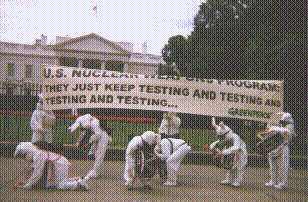

WASHINGTON, July 2 - Greenpeace today condemned he U.S. decision to conduct the first in a series of controversial, underground nuclear weapons experiments at the Nevada Test Site saying that the tests ran counter to the growing international momentum toward nuclear disarmament. Today's experiment, code-named REBOUND, was designed and engineered by Los Alamos National Laboratory in New Mexico and involved roughly 1,500 grams of nuclear weapons plutonium coupled with three conventional explosions.
The United States plans to conduct at least five more experiments at the Nevada Test Site over the next two years. Scientists design the experiments so the plutonium involved will not reach a critical mass - thus the term "subcritical." Data gathered from the tests will be plugged into the world's fastest supercomputers, so that weaponeers can better predict the "performance" of nuclear weapons. The U.S. Department of Energy also states that the subcritical tests will be used for the United States to maintain "the basic capability to resume nuclear test activities prohibited by the [Comprehensive Test Ban Treaty] should the United States cease to be bound to adhere to this treaty."
"The Clinton administration should be leading the world effort to bring the Comprehensive Test Ban Treaty into force instead of maintaining the ability to break out of that hard-fought treaty," said
Greenpeace Nuclear Disarmament Campaigner Bruce Hall. "President Clinton has the opportunity to set the pace of progress on nuclear disarmament. These tests are a step in the wrong direction."
U.S. government officials claim that the subcritical experiments are consistent with the letter of Comprehensive Test Ban Treaty, but Greenpeace charges that the tests violate the spirit of the test ban that prohibits "any nuclear weapon test explosion or any other nuclear explosion." Over 140 countries have signed the test ban since September 24, 1996. So far none of the five declared nuclear powers have ratified the treaty.
Greenpeace also raised the concern that the United States subcritical experiments set a dangerous precedent for other nations, most notably Russia and China, to conduct similar nuclear weapons tests at their test sites.
"These tests can only make the daunting task of verifying the Comprehensive Test Ban Treaty more difficult," said Hall. "The United States could remove any doubts about test ban compliance by canceling the subcritical tests and seeking agreement with Russia and China to close the world's remaining nuclear test sites - Nevada, Novaya Zemlya, and Lop Nor."
France announced in 1996 that it would permanently close its nuclear test sites in the South Pacific. The United Kingdom has relied on the U.S. test site since the 1960s.
FOR MORE INFORMATION CONTACT: Bruce Hall at Greenpeace - (202)319-2514.
Bruce Hall
Greenpeace Nuclear Disarmament Campaign
1436 U Street NW
Washington, DC 20009
bruce.hall@wdc.greenpeace.org>
WHEN SPIDERS UNITE, THEY CAN TIE DOWN A LION --Ethiopian Proverb